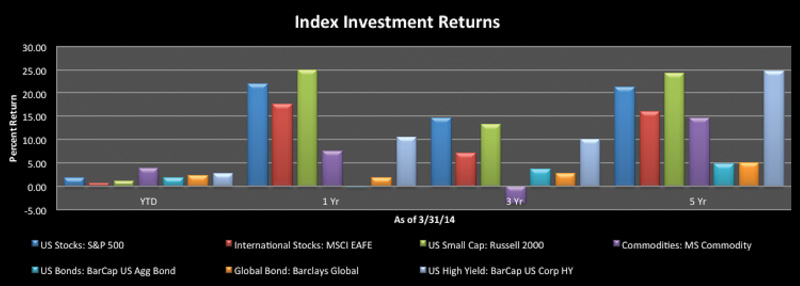The below chart reflects the Center for Financial Planning’s Investment Committee current positioning relative to our longer-term strategic models.
Maintain a modest equity overweight as Leading indicators suggest better global growth ahead
Expect equities to outperform bonds and cash and fixed income to underperform
Continue to favor tactical allocation strategies
Underweight U.S. equity allocations given relative valuations and we see potentially better opportunities in select international equities.
Asset Class Definitions
Core Bonds: Securities with primary exposure to bonds with historically low default risk and high correlation to Barclay’s U.S. Aggregate Bond Index. This includes Investment Grade bonds with Intermediate Maturities. This index covers the U.S. investment grade fixed rate bond market, with index components for government and corporate securities, mortgage pass-through securities, and asset-backed securities. These major sectors are subdivided into more specific indexes that are calculated and reported on a regular basis. Municipal Bonds are also included.
Strategic Income: Securities with primary exposure to bonds with less interest rate risk and types of bonds that are less correlated to the Barclay’s U.S. Aggregate Bond Index. This covers the universe of fixed-rate, non-investment grade debt (High Yield). Canadian and global bonds (SEC-registered) of issuers in non-EMG countries are included.
U.S. Large Cap Equity: Securities correlated to the Russell 1000 Index: Based on a combination of their market cap and current index membership, this index consists of approximately 1,000 of the largest securities from the Russell 3000. Representing approximately 92% of the Russell 3000, the index is created to provide a full and unbiased indicator of the large cap segment.
U.S. Small/Mid Cap Equity: Securities correlated to Russell Midcap Index: A subset of the Russell 1000 index, the Russell Midcap index measures the performance of the mid-cap segment of the U.S. equity universe. Based on a combination of their market cap and current index membership, includes approximately 800 of the smallest securities which represents approximately 27% of the total market capitalization of the Russell 1000 companies. The index is created to provide a full and unbiased indicator of the mid-cap segment. Securities also correlated to the Russell 2000 Index. The Russell 2000 Index measures the performance of the small-cap segment of the U.S. equity universe. The Russell 2000 is a subset of the Russell 3000 Index representing approximately 10% of the total market capitalization of that index. It includes approximately 2000 of the smallest securities based on a combination of their market cap and current index membership. The Russell 2000 Index is constructed to provide a comprehensive and unbiased small-cap barometer and is completely reconstituted annually to ensure larger stocks do not distort the performance and characteristics of the true small-cap opportunity set.
International Large Cap: Securities are correlated to the MSCI EAFE. This index is a free float-adjusted market capitalization index that measures the performance of developed market equities, excluding the U.S. and Canada. It consists of the following 22 developed market country indices: Australia, Austria, Belgium, Denmark, Finland, France, Germany, Greece, Hong Kong, Ireland, Israel, Italy, Japan, the Netherlands, New Zealand, Norway, Portugal, Singapore, Spain, Sweden, Switzerland and the United Kingdom.
International Small/Mid Cap: Securities are correlated to the MSCI EAFE Small-Cap Index. This index is an unmanaged, market-weighted index of small companies in developed markets, excluding the U.S. and Canada.
Strategic Equity: Securities with exposure to alternative investments that are less correlated to stocks and bonds with expectations and investments that can span across asset classes. Also includes investments in managed futures.
*This material is for informational purposes only and should not be used or construed as a recommendation regarding any security outside of a managed account. Any opinions are those of The Center for Financial Planning and not necessarily those of Raymond James. Expressions of opinion are as of 03/31/2014 and are subject to change. Diversification and asset allocation do not assure a profit or protect against loss. The prices of small company stocks may be subject to more volatility than those of large company stocks. International investing involves additional risks such as currency fluctuations, differing financial and accounting standards, and possible political and economic instability. Investing in emerging markets can be riskier than investing in well-established foreign markets. Investing involves risk and investors may incur a profit or a loss. Bond prices and yields are subject to change based upon market conditions and availability. If bonds are sold prior to maturity, you may receive more or less than your initial investment. There is an inverse relationship between interest rate movements and fixed income prices. Generally, when interest rates rise, fixed income prices fall and when interest rates fall, fixed income prices rise. High-yield bonds are not suitable for all investors. The risk of default may increase due to changes in the issuer's credit quality. Price changes may occur due to changes in interest rates and the liquidity of the bond. When appropriate, these bonds should only comprise a modest portion of a portfolio. Investments in municipal securities may not be appropriate for all investors, particularly those who do not stand to benefit from the tax status of the investment. Municipal bond interest is not subject to federal income tax but may be subject to AMT, state or local taxes. Global bonds tend to be denominated in the currency of the country in which they are issued. Most global bonds have higher default and currency risks than U.S. bond issues. Also, in some cases foreign governments don't allow the purchase of government bonds by non-residents. Managed futures involve specific risks that may be greater than those associated with traditional investments and may be offered only to clients who meet specific suitability requirements, including minimum net worth tests. You should consider the special risks with alternative investments including limited liquidity, tax considerations, incentive fee structures, potentially speculative investment strategies, and different regulatory and reporting requirements. You should only invest in hedge funds, managed futures or other similar strategies if you do not require a liquid investment and can bear the risk of substantial losses. There can be no assurance that any investment will meet its performance objectives or that substantial losses will be avoided. Individuals cannot invest directly in any index. Past performance does not guarantee future results.




















